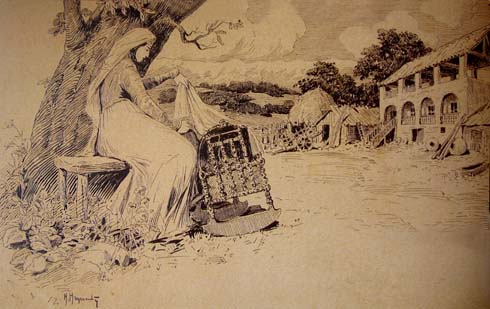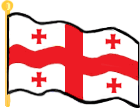იავნანა ბატონებო
"Iavnana" is a type of lullaby that has sometimes been sung as a healing song. Iavnana were particularly sung when children had infectious diseases like smallpox.
Some healing songs are addressed to the "batonebi" - the spirit lords who was believed to have taken possession of the sick child. Treats like pastries would be brought as offerings for the "batonebi" to enjoy.
In the song you'll notice mention of violets and roses. "Iav" means "violet" and "vardo" means "rose". They're in the vocative case which means they're being addressed as if they represent specific figures. (Note that the "nana" in iavnana is believed to refer to a goddess.)
I tried to reflect some of these concepts in the translation.

იავნანა ბატონებო
Lullaby Spirit Lords
Lullaby
Lullaby
(Georgian)
(English)
იავნანა, ბატონებო, ვარდო ბატონებო,
იავნანა, ბატონებო, ვარდო ბატონებო,
დატკბით, დატკბით, დაშოშინდით, ვარდო ბატონებო
დატკბით, დატკბით, დაშოშინდით, ვარდო ბატონებო
Lullaby, o violet, o spirit lords, o rose, o spirit lords,
Lullaby, o violet, o spirit lords, o rose, o spirit lords,
Enjoy, enjoy, o rose, o spirit lords,
Enjoy, enjoy, o rose, o spirit lords.
Notes
Pronunciation:
Iavnana, bat'onebo, vardo bat'onebo
Iavnana, bat'onebo, vardo bat'onebo
Dat'k'bit, dat'k'bit, da shoshmindit, vardo bat'onebo
Dat'k'bit dat'k'bit, da shoshmindit, vardo bat'onebo
Comments
This lullaby comes from the region of Georgia called Racha. This is sometimes referred to as Rachuli Iavnana (lullaby). It's a call and response song.
You can read more about Iavnana here.

Thanks!
Thanks and Acknowledgements
Image: "Georgian Woman Singing an Iavnana", by Polish-Georgian artist, Henryk Hryniewski (1910's).
Translation: Mama Lisa
We welcome help fine-tuning the translation. Please email me with suggestions. Thanks! Mama Lisa
























